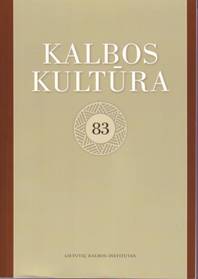Studentų kalbos kultūros žinių taikymo įgūdžiai
Students’ skills in the use of language
Author(s): Kęstutis BredelisSubject(s): Baltic Languages, Higher Education
Published by: Lietuvių Kalbos Institutas
Summary/Abstract: The article decribes a study of language use skills as they are reflected in test scores of a language test, formal assessment records and state examination scores of first-year medical students. The data has been used to establish whether linguistic competence of the students correlates with changes in the teaching process at school which have been caused by the recent development of the state examination of Lithuanian.The process of language teaching in Lithuania is prescribed by the General Curricula for primary, basic, or lower secondary, and secondary education. The provisions of the General Curricula provide a basis for school textbook writing in all disciplines, Lithuanian included. The last decade has witnessed a major reform in the teaching of proper language use. As a consequence, language use has disappeared from the curriculum as a separate discipline and is currently integrated in the topics of morphology, syntax and other aspects of language.Furthermore, the final assessment of written tasks has been developed to include a criterion of grammatical and lexical accuracy. As regards the state examination of Lithuanian, the weight of language accuracy assessment in the examination paper has been constantly increasing while the number of isolated language use tasks has been decreasing till such tasks have completely been abandoned.The data of the study reveals that the average final assessment of medical students at school was between 7,99 and 8,85. The average state examination score is 75,86–85,71 points. These high marks suggest that their language use skills should also be good. In the period from 2003 till 2010, a test of language use was administered to the subjects. The test scores show that the best results were achieved in 2004 while the worst in 2009. The analysis of test scores andfinal assessment revealed two distinct groups of students in terms of success in the language use test: subjects who finished secondary education in 2003–2006 were consistently better in the language use test than those who finished school in 2002 and 2007–2009. The observed decrease in the test scores coincides with the elimination of certain language use tasks from the state examination of Lithuanian in 2007. Moreover, none of the subjects who finished secondary education in 2008 and 2009 managed to do all the test items correctly or only err in a single test item.The study suggests that language use skills of the first-year students are weaker than in the previous years. One of the reasons might be related to the absence of language use as a separate discipline in the school curriculum and its inadequate integration in the teaching of other aspects of language. Besides, the state examination paper does not include a task specifically focused on language use while the weight of this aspect is too low in the final assessment of writing.
Journal: Bendrinė kalba (iki 2014 metų – Kalbos kultūra)
- Issue Year: 2010
- Issue No: 83
- Page Range: 297-306
- Page Count: 10
- Language: Lithuanian

